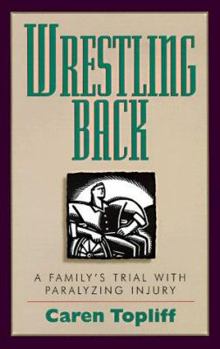Wrestling Back: A Family's Trial with Paralyzing Injury
No Synopsis Available.
Format:Paperback
Language:English
ISBN:0931625319
ISBN13:9780931625312
Release Date:May 1996
Publisher:DIMI Press
Length:278 Pages
Weight:0.74 lbs.
Dimensions:0.6" x 5.5" x 8.5"
Customer Reviews
1 rating
wrestling with acceptance
Published by Thriftbooks.com User , 23 years ago
Author Caren Topliff is correct in her assertion that there are not enough resources available to help patients and families faced with spinal cord injury (SCI). Wrestling Back should be applauded for its stark and unembellished storytelling. It is a thought provoking memoir, and very hard to put down. Topliff includes an appendix with contact information for SCI advocacy and treatment resources. As an able-bodied person, can I imagine my legs not responding to my commands? I try. Can I imagine how permanent the word permanent can be? Wrestling Back is a terrifying first-person account written by the mother of an Olympic-bound college athlete who is permanently paralyzed in a car accident. Topliff's story of her son's struggle to live drives it home that there is a huge family drama behind spinal cord injuries. Even when the patient regains independence, the struggle to accept a new life with physical limits is unthinkable to most of us. Topliff deserves praise for her painstaking and candid account of the tensions in her family, the medical care her son received, and her exhausting vigilance. It is notable that she spent much of her energy convincing her son to fight for his life yet couldn't always support herself in the same way: her quality of life often seemed depressingly low. Maybe it was the relentless pace and tone in which she wrote the story, with intense focus on the central experience of supporting her son, but I felt drained after finishing the book. It takes a pragmatic and focussed mindset to support someone who has suffered a major trauma. Topliff was as much a survivor as her son, but her efforts took an incredible toll on her. In a physical sense, the SCI patient (statistically, a young adult) becomes an infant again at the time of the injury, and the mother often builds an exclusive relationship with the born again child, monopolizing the chores of physically caring for that child to the detriment of her family and herself. Topliff exhausted her physical and spiritual self as Larry's primary caregiver. Larry not only went through a rebirth as a quadraplegic, but also a second adolescence. Until he married, his mother lived with him in the same house, sleeping with one eye open and monitoring every aspect of his health. She didn't or couldn't allow her son to be fully independent. While it can't be denied that Larry had many physical complications and needed of a lot of care, is it possible that Topliff, in spite of herself, internalized the stereotype of the helpless disabled child-person in the wheelchair? Through much of the book I felt Topliff was hoping for unattainable outcomes, for a cure. Perhaps she used hope as a lifeline. Unrealistic hope can be a defense mechanism against facing something that feels unacceptable. It is part of the human condition to long for what you cannot have. For someone whose body has been broken, whose sense of self has been shattered -- this longing for a return to 'normalcy' must become acu






